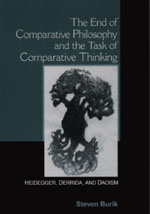This lecture proposes to delve into the Daoist yin-yang cosmology by referring to the etymological make-up of a number of compound-nouns, i.e. 经验 (experience), 关系 (relation) and 体会 (bodily-recognition), etc. in the Chinese language. Through an analysis of these pairings which emulate certain foldings or overlapping of 虚 (empty) / 实 (solid), and finally summated into the Deleuzian transcendent/ empiricism, this lecture aims at a bringing together the concept of yin-yang and Deleuze’s philosophy of becomings within the context of human/ nature relation. Meanwhile, the lecture will follow Deleuze’s dic-tum to “connect, conjugate and differentiate” in detailing how a new materialism under the banner of posthumanism can be used to orchestrate a harmonic duet with Daoism, particularly in terms of how eco-logical aesthetics moves into ecoethics.
Chair : A/P Yung Sai-Shing (Department of Chinese Studies)
Date : Thursday, 3 April, 2014
Time : 11:00 am – 12:30 pm
Venue : AS7/03-30 (Chinese Studies Meeting Room)
About the Speaker:
Prof. Wong Kin Yuen is the Head and Professor of English Department at Hong Kong Shue Yan Universi-ty. He is also the Director of the Technoscience Culture Research and Development Centre at SYU. Be-fore coming back to Hong Kong, Prof. Wong taught in Comparative Literature Department at University of California, San Diego and Foreign Language and Literature Department at National University of Taiwan. Prof. Wong taught in the English Department of the Chinese University of Hong Kong for 20 years and later founded the Modern Languages and Cultural Studies Department. He has also taught literature, East-West comparative poetics, cultural studies, science fiction, ecological ethics, technoscience culture, film studies and visual arts at various Hong Kong universities. Topics of his published works include Posthu-man culture, cyberculture, aesthetics, hermenuetics, film theory as well as Deleuze studies.

